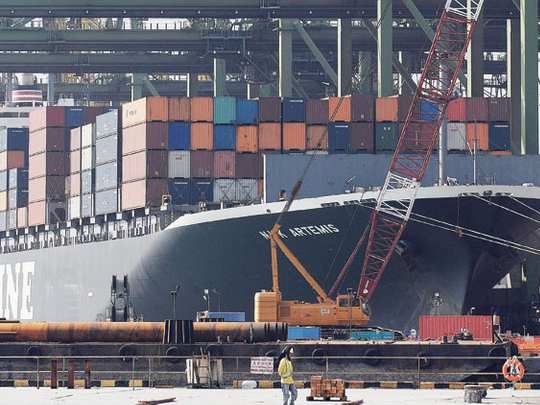
Singapore: The economic recovery that rocketed through Asia starting last year has been felt in the usual ways — a thickening parade of cargo ships around this trade-driven city-state, rising real estate and stock prices — but it was demand for personal computers in Indonesia that caught the attention of executives at computer memory maker Showa Denko.
Even with US and European consumers controlling their spending because of fears over the economy, the company boosted production and began building new manufacturing lines on the basis of expected growth in Asia.
That dynamic shows the contours of the post-crisis global economy and the challenges President Barack Obama faces in his effort to double US exports.
US sales abroad jumped by more than 3 per cent from February to March, the Commerce Department reported last week, although imports jumped even more and the trade deficit grew slightly.
Still, the administration is focused on exports as a source of new jobs, and it is hoping to encourage the trend with such initiatives as a trade mission to Indonesia and China this month being led by Commerce Secretary Gary Locke.
A rebound in exports from the lows of the recent recession was to be expected.
The key to reaching the plateau set by Obama — $3 trillion (Dh11.03 trillion) in annual exports by 2015 — will be expanding the US presence in Asia.
But right now, Asia appears to be doing fine on its own. It is the one region of the world that is relatively stable, largely free of the banking and debt troubles that have filled the streets of Athens with enraged demonstrators and forced Spain to cut wages, provoking the country's largest labour union to announce strike plans Thursday. Portugal responded with plans to raise taxes and cut pay for its government workers.
"Who is going to double their imports? It's not clear," said Ravi Menon, permanent secretary at Singapore's Ministry of Trade and Industry.
He said the rising demand in Asia for appliances, clothing, consumer electronics and household goods won't be of much help to US businesses.
"We have seen demand rebound, but it is very much supported by emerging countries: China, India, Indonesia," said Masanori Kudo, senior vice president at Showa Denko, a Japanese conglomerate.
Its Singapore-made hard-drive components are shipped to computer makers in such places as Taiwan for final assembly, an example of how production has been integrated across the region.
The addition of rising Asian consumer demand, the IMF reported recently, marks a historic turn.
"This is the first time Asia is leading a global recovery," the IMF wrote in a recent report, with growth based not just on exports but also on "resilient domestic demand" and a strong surge in investment.
The US remains by far the world's largest economy, a critical market for other nations and central still to Asia's growth prospects. It also is still the world's top exporter of goods and services, although China is closing that gap.
Contrast
But forecasts for sustained unemployment and slower growth in the developed world, as well as high levels of debt, have created a sense of retrenchment among the industrialised nations.
In contrast, Asia features China's double-digit expansion, the extensive infrastructure spending being planned in India and the rising affluence of trading societies such as Singapore.
Asian growth will still be good news for US companies. The silicon chips in an Indonesian family's new computer may well come from a US plant.
US management and engineering companies may well oversee some of the billions of dollars expected to be spent on roads, airports and shipping terminals in the region.
Rising incomes will mean more sales of US or European branded goods, a bigger audience for Hollywood movies and more demand for management and other services.












